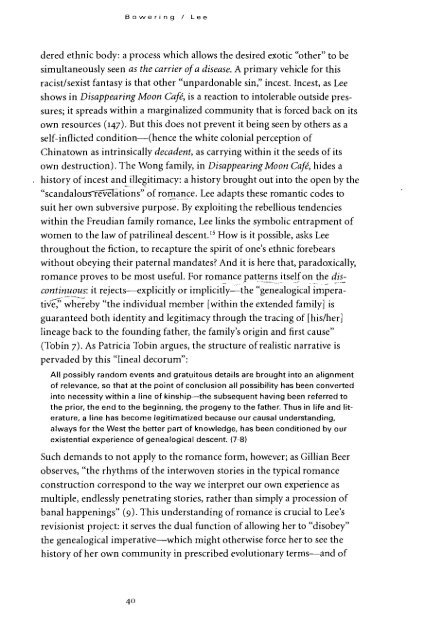To All Appearances A Lady - University of British Columbia
To All Appearances A Lady - University of British Columbia
To All Appearances A Lady - University of British Columbia
You also want an ePaper? Increase the reach of your titles
YUMPU automatically turns print PDFs into web optimized ePapers that Google loves.
B o w e r i n g / L e e<br />
dered ethnic body: a process which allows the desired exotic "other" to be<br />
simultaneously seen as the carrier <strong>of</strong> a disease. A primary vehicle for this<br />
racist/sexist fantasy is that other "unpardonable sin," incest. Incest, as Lee<br />
shows in Disappearing Moon Café, is a reaction to intolerable outside pressures;<br />
it spreads within a marginalized community that is forced back on its<br />
own resources (147). But this does not prevent it being seen by others as a<br />
self-inflicted condition—(hence the white colonial perception <strong>of</strong><br />
Chinatown as intrinsically decadent, as carrying within it the seeds <strong>of</strong> its<br />
own destruction). The Wong family, in Disappearing Moon Café, hides a<br />
history <strong>of</strong> incest and illegitimacy: a history brought out into the open by the<br />
"scandalousTëvëTations" <strong>of</strong> romance. Lee adapts these romantic codes to<br />
suit her own subversive purpose. By exploiting the rebellious tendencies<br />
within the Freudian family romance, Lee links the symbolic entrapment <strong>of</strong><br />
women to the law <strong>of</strong> patrilineal descent. 15 How is it possible, asks Lee<br />
throughout the fiction, to recapture the spirit <strong>of</strong> one's ethnic forebears<br />
without obeying their paternal mandates? And it is here that, paradoxically,<br />
romance proves to be most useful. For romance patterns itself on the discontinuous:<br />
it rejects—explicitly or implicitly—the "genealogical imperative,"<br />
whereby "the individual member [within the extended family] is<br />
guaranteed both identity and legitimacy through the tracing <strong>of</strong> [his/her]<br />
lineage back to the founding father, the family's origin and first cause"<br />
(<strong>To</strong>bin 7). As Patricia <strong>To</strong>bin argues, the structure <strong>of</strong> realistic narrative is<br />
pervaded by this "lineal decorum":<br />
<strong>All</strong> possibly random events and gratuitous details are brought into an alignment<br />
<strong>of</strong> relevance, so that at the point <strong>of</strong> conclusion all possibility has been converted<br />
into necessity within a line <strong>of</strong> kinship—the subsequent having been referred to<br />
the prior, the end to the beginning, the progeny to the father. Thus in life and literature,<br />
a line has become legitimatized because our causal understanding,<br />
always for the West the better part <strong>of</strong> knowledge, has been conditioned by our<br />
existential experience <strong>of</strong> genealogical descent. (7-8)<br />
Such demands to not apply to the romance form, however; as Gillian Beer<br />
observes, "the rhythms <strong>of</strong> the interwoven stories in the typical romance<br />
construction correspond to the way we interpret our own experience as<br />
multiple, endlessly penetrating stories, rather than simply a procession <strong>of</strong><br />
banal happenings" (9). This understanding <strong>of</strong> romance is crucial to Lee's<br />
revisionist project: it serves the dual function <strong>of</strong> allowing her to "disobey"<br />
the genealogical imperative—which might otherwise force her to see the<br />
history <strong>of</strong> her own community in prescribed evolutionary terms—and <strong>of</strong><br />
40

















